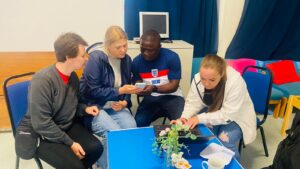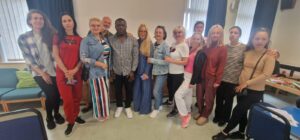DOT UK Supports Digital Inclusion through Digital Skills for Displaced Youth in the North East
Over June and July, 2024 Digital Opportunity Trust UK celebrated the end of Digital Inclusion North East, a Phase 1 project and the first of DOT UK serving communities in the UK. Phase 1 aimed to comprehensively understand the needs and challenges faced by displaced youth (age 18 to 35) in the North East of England, in acquiring digital skills. The findings of the report, which can be read in full here, were that there was:
- Existing Ecosystem: The research reveals a nuanced landscape of organisational services in the North East which includes those offering housing, English language services, asylum seekers case support, refugee integration services, and business and enterprise training.
- Ecosystem Gap: Despite the diverse array of services available in the North East, there is a notable gap in terms of organisations offering digital skills training for entrepreneurship, remote work and employability, to prepare displaced youth for a successful transition.
- Challenges Faced by Displaced Youth: Mental health disclosure, language barriers, limited access to devices, and connectivity issues emerged as significant hurdles for displaced youth to access and unlock essential digital skills.
- Challenges Faced by Service Organisations: Competition for funding stifles collaboration and partnership, negatively affecting the holistic development of displaced people.
Phase 1 Findings, transitioned into the launch of Phase 2, with the support of the Good Things Foundation(LINK) Impact Grant. Phase 2 commenced with the support of the Good Things Foundation Impact Grant and focussed on designing with users foundational Digital Skills for Work. Partnering with outreach partners Action Foundation, West End Refugee Service and UK & UA Sunderland, DOT connected young people aged (18-35) to DOT’s Learning Management System (LMS), where participants accessed three different learning pathways. Participants were required to select at least one pathway at the time of their registration. These included Internet Browsing, Digital Communications and Digital Marketing.
Participants were onboarded through partners, with the support of DOT UK’s Youth Leadership Advisory Board (YLAB), and were brought through the LMS account registration and pre-assessment to determine their skills baseline. They then entered into a 4 week, self paced, hybrid learning experience, supported by a whatsapp group to foster connection between participants and to support one another. The learning experience was designed to test and validate assumptions and insights gathered through previous co-design workshops and research projects. This approach, a core pillar of all of DOT’s programs allowed DOT UK to build more impactful, accessible, inclusive, and valuable programs and understand the impact of the intervention.. The participants then went through a post-assessment evaluation to determine the skills they developed. This was assessed based on the gathered feedback. Following this, DOT UK is building relationships with transition partners so that those who complete the programme are directed to remote work, internships, entrepreneurship or advanced learning opportunities.
Complementary to the virtual learning experience, participants were also provided with sim cards with internet access to ensure uninterrupted learning and access to devices and/or desktops at the Action Foundation drop-in center to further facilitate learning.

Placing community leadership at center of all projects and programs continues to be upheld across the DOT network, and DOT UK is no different. Through partnering with organisations embedded in the community, DOT ensures that meet those that require these services. Through that, it’s possible to leverage their expertise and insights on how best to conduct the project. In total, 2 community leaders were onboarded, 57 learners who registered their interest (46% Male / 54% Female), 24 of which went on to onboard to DOT’s LMS to start learning, 1 of which completed one of the learning pathways. In total, 16 sim cards were distributed to learners and 3 devices were gifted to the Action Foundation.
The project, whilst a success, generated a lot of learnings for the DOT UK team. Through this testing phase, a number of insights were gathered which will feed into future iterations of the programme. The project generated a number of learnings for the DOT UK team. Throughout implementation DOT collected feedback from participants and iterated as needed. These learnings and actions are as follows:
- Onboarding should be made easier, to encourage quick and frictionless sign up, making the process more inviting for participants when they first interact. DOT implemented automatic elements to streamline and simplify the boarding process.
- Strict onboarding by cohort doesn’t work. It’s better to have a rolling registration to accommodate some participants better. This coupled with a greater emphasis on the fact that this was a joint initiative between the outreach partners (Action Foundation, West End Refugee Service and UK & UA Sunderland) and DOT UK fostered a better understanding and collaboration.
- The hybrid learning approach was best supported by a peer to peer support model. Interactive tools like WhatsApp groups and a more engaging Learning Management System (LMS) were needed to strengthen the impact of the programme. The WhatsApp group was regulated and run by a YLAB member. DOT UK and the UK YLAB are collaborating to improve the DOT LMS automation, such as regular reports on progress in each learners journey.
- Language accessibility can be improved. The course’s english level needs to be assessed so it can be made easier for learners ie. suitable for Level 1, 2 or 3. DOT is exploring the use of AI solutions to support learners access
- Whilst the split between learners was 46% male and 54% female, a peer group of young females who can support each other and encourage their participation. The project achieved a good balance and will continue to focus on young women and build out this peer group.
- A full-time position dedicated to outreach will increase the effectiveness and impact of the project.
With these learnings in mind, YLAB board (members) will be supporting the development of a Community of Practice(CoP) for young facilitators and community outreach leaders with lived experience to support with mobilization and delivery of the programme, to imbed these learnings into future initiatives.

DOT UK is committed to increasing the digital inclusion of displaced youth in the North East of England and beyond. DOT UK is thankful to the Good Things Foundation for their support and trust in DOT to uphold the shared values and goals of the foundation.
If you are interested in collaborating with DOT UK or any of the partners, please reach out to Vickie Wambura at vwambura@dotrust.org. We’re interested in hearing from anyone, but particularly those who can help us reach more young people or scale DOT UK’s impact across more regions of the UK.
Are you our next Community Leader, Digital Champion, or Social Innovator? Learn more about how to join #DOTYouth
Join #DOTYouthShare this Post
More ARTICLES
Read more like this.